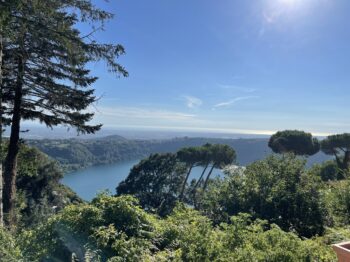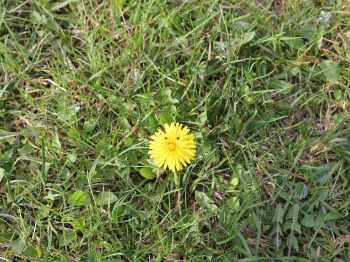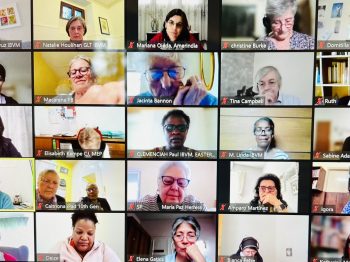 On the 30th January 1645, Mary Ward died peacefully. At that time, the burial of Catholics in England was difficult. Mary’s companions found ‘a little churchyard, where the minister was honest enough to be bribed.’
On the 30th January 1645, Mary Ward died peacefully. At that time, the burial of Catholics in England was difficult. Mary’s companions found ‘a little churchyard, where the minister was honest enough to be bribed.’
This minister was an Anglican minister in the village of Osbaldwick, near Heworth. On her tombstone, we can read this inscription:
“To love the poor persevere in the same live die and rise with them was all the aim of Mary Ward who having lived 60 years and 8 days ayme died 20th [sic] January 1645.”
By choosing the model offered by Jesus, to promote a relationship to the world not based on domination but on dignity and equality, Mary Ward chose to respond to God’s divine will with the fire of love. “To love the poor…live, die and rise with them was all the aim of Mary Ward.” In Hebrew, the word ‘Avodah’ means call, vocation and service. But ‘Avodah’ is also the word used for prayer!
Mary Ward, ‘a contemplative in action’, lived her ‘avodah’ with those who were socially marginalized, socially ‘bullied’, especially the women who lacked the education available to men. Her ‘avodah’ led her to make the difference by being a Lover of Truth and a Doer of Justice, experiencing connectedness and solidarity with the ‘bullied’ of her time.
Living in a hierarchically structured society, Mary Ward heard the call to engage herself in works of charity and justice for ‘the Glory of God’. In those days, it was a common belief that women, their lives and actions were insignificant. She had to find great courage to fight for the respect of the rights of people regardless of intellectual ability, emotional and social or physical and gender differences. Where did she find the courage? Indeed from her faith, but we must highlight the fact that the roots of her courage also came from her family background. The Ward family is known to have been protecting ‘bullied’ people when providing shelter to Catholic priests who were keeping the faith alive in England. She came from a family where women were brave and generous: Mary’s maternal grandmother, Mrs Ursula Wright spent fourteen years consecutively in prison for her faith.
Mary Ward was able to recall her memories of the period when Ursula used to secretly provide money and food to Catholic prisoners; women who were agents of social change with all those who required respect, solidarity, empowerment. Mary Ward herself engaged in providing education for girls at all levels of society.
Her ‘avodah’ lead her to be with the ‘bullied’ of her time and to ‘Take the same of the Society’ (The Jesuits). Her mission was certainly a radical change for her time, yet also a change which caused her to be bullied among the bullied, marginalized among the marginalized. Mary Ward experienced verbal bullying – being called with her companions ‘galloping girls’, an inappropriate sexual comment which hurt their reputation; on the 13th January 1631 the papal bull of suppression under Pope Urban VIII made use of harsh and rude words, compelling Mary Ward’s Institute, considered as dangerous poison to suppress: “…works which most unsuited to their weak sex and character, to female modesty and particularly to maidenly reserve”, thus condemning these women simply because they were women and therefore beings of inferior intellectual capacity.
“Live, die and rise with them”. Bullied, marginalized, Mary Ward faced censure bravely. When the papal bull condemned her to prison, she accepted it courageously, faithfully, asking her friends in her lemon-juice letters to continue to be ‘in a cheerful mind’. In front of her bullies, she continued to encounter the love of God in all situations, particularly in times of torment and persecution. She made the difference by being the difference: the one who promotes peace and respect, by living her commitment till the end, by ‘rising’ in love with all the marginalized, and with ‘the marginalized Jesus’.
Mary Ward’s ‘avodah’ is the ‘avodah’ of all those who commit themselves to God’s people, who develop awareness and recognize the inherent injustices of the time. Our compassionate engagement in works of charity and justice in our own lives, families, locally and globally, allows us to witness God’s divine love for and with the bullied of all times. Be the difference where we are, make the difference in any form of service to the world and to the rest of humanity.
Mary Ward’s ‘avodah’ is an ‘avodah’ for all her friends, for religious and lay people, not to stand on the shore, to put out into deep water’ (Lk 5:4), to believe in our call to mission and to extend ‘to the extreme edge and cross boundaries… Let our hearts explore and reach new horizons by loving and persevering to stand up to the bullies of our times as ‘ it is impossible to love God and not to labour to extend his honour’.
In the school yard of Loreto College Port-Louis, Mauritius, we have a game called “La marelle de Mary Ward”. It represents the life of our foundress. One square contains open circles with a question mark asking: are we extending to those who are on the border, the marginalized? The same call is addressed to us today.
Francesca Salva – Friends of Mary Ward, Mauritius










